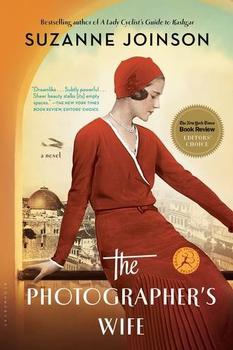Summary | Excerpt | Reading Guide | Reviews | Beyond the Book | Read-Alikes | Genres & Themes | Author Bio

Critics' Opinion:
Readers' Opinion:
First Published:
Feb 2016, 320 pages
Paperback:
Feb 2017, 352 pages
 Book Reviewed by:
Book Reviewed by:
Davida Chazan
Buy This Book
Please be aware that this discussion guide will contain spoilers!
These discussion questions are designed to enhance your group's discussion about The Photographer's Wife, a novel about an artist who is forced to confront her past, including family secrets and the political turmoil they caused, when one of her father's former employees tracks her down in the late 1930s.
Suggested Reading
A Lady Cyclist's Guide to Kashgar by Suzanne Joinson
A Bitter Truth by Charles Todd
Brideshead Revisited by Evelyn Waugh
The House at Riverton by Kate Morton
Ploughing Sand: British Rule in Palestine, 1917–1948 by Naomi Shepherd
Unless otherwise stated, this discussion guide is reprinted with the permission of Bloomsbury USA. Any page references refer to a USA edition of the book, usually the trade paperback version, and may vary in other editions.





The Flower Sisters
by Michelle Collins Anderson
From the new Fannie Flagg of the Ozarks, a richly-woven story of family, forgiveness, and reinvention.

The House on Biscayne Bay
by Chanel Cleeton
As death stalks a gothic mansion in Miami, the lives of two women intertwine as the past and present collide.

The Funeral Cryer by Wenyan Lu
Debut novelist Wenyan Lu brings us this witty yet profound story about one woman's midlife reawakening in contemporary rural China.
Your guide toexceptional books
BookBrowse seeks out and recommends the best in contemporary fiction and nonfiction—books that not only engage and entertain but also deepen our understanding of ourselves and the world around us.